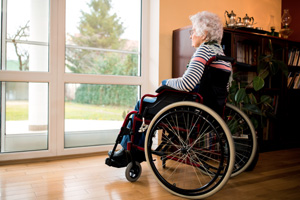 Abuse in a nursing home can come in different forms. One of the most overlooked and prevalent is emotional abuse, sometimes called psychological or mental abuse. Because emotional abuse does not leave physical evidence and scars, it is harder to notice in your loved one.
Abuse in a nursing home can come in different forms. One of the most overlooked and prevalent is emotional abuse, sometimes called psychological or mental abuse. Because emotional abuse does not leave physical evidence and scars, it is harder to notice in your loved one.
The toll emotional abuse can take on your loved one can be devastating. If you suspect your loved one is enduring emotional abuse in a nursing home, it may benefit you to speak with an experienced nursing home abuse attorney for guidance surrounding your claim and receive justice for the suffering caused to your loved one.
Types of Emotional Abuse Prevalent in Nursing Homes
Emotional abuse can cause depression, fear, helplessness, and anxiety in a nursing home resident. However, it is not always apparent, especially detecting the purposeful infliction of emotional harm and anguish to a loved one.
Having to endure this daily in a nursing home can result in detrimental emotional damage and can result in the rapid decline of their cognitive and physical wellbeing. Although it is not as common, emotional abuse can come from other nursing home residents, as well as nursing home staff.
Emotional abuse can be classified as verbal or nonverbal. Verbal abuse can look like the following:
- Threatening
- Shouting and yelling
- Mocking
- Humiliating or embarrassing
- Shaming
- Insulting or ridiculing
- Ignoring the resident
- Gossiping or speaking badly about the resident to other staff members
- Being callous, mean, and cruel
Nonverbal emotional abuse can cause just as much emotional damage to the resident, if not more. This type of abuse is concealed and hard to express to others what they are experiencing. A few examples of nonverbal abuse include:
- Threatening or scaring the resident with a look
- Purposefully isolating the resident from loved ones
- Ignoring residents when they ask for help or assistance
- Giving them the silent treatment
- Detaining them indoors or from speaking to anyone
- Moving the resident’s tools and devices out of reach (glasses, canes, walkers, or wheelchairs)
- Restricting access to food, water, and the bathroom
- Hiding personal belongings to induce distress
- Treating the resident as a child
- Pretending to cause physical harm
Emotional abuse can severely affect your family member’s emotional and physical health. If your family member has expressed enduring emotional abuse and neglect, contact a nursing home abuse attorney regarding your claim. You may be able to recoup financial damages for the pain and suffering your loved one has had to endure.
How to Recognize the Specific Signs of Emotional Abuse in a Nursing Home
Emotional abuse can go unnoticed if you are not paying attention to the subtleties your loved one may be enduring. It is important to look for sudden changes in mood and behavior in your loved one’s personality.
If you observe any of the indications below, it may be best to take immediate steps to protect them from further abuse:
- Sudden changes in personality such as anxiety, anger, or depression
- Withdrawal from family, friends, and activities
- Disinterest in activities they once enjoyed
- Expressing thoughts of self-harm or suicide
- Failing to take medication
- Disregard for personal hygiene
- Changes in weight, appetite, and sleep patterns
- Expressing fear of a staff member
- Signs of low self-esteem, fear, or nervousness
- Anxious tics such as nail-biting, hair pulling, or thumb sucking
If you have noticed these behaviors in your loved one, it may be a sign of nursing home abuse. It may be beneficial to take them out of their situation to prevent them from enduring further abuse and physical decline. Consult an experienced nursing home abuse lawyer to hold nursing home abuse staff accountable for their actions.
Warning Signs of Nursing Home Abuse in Caretakers
Caretakers can also display warning signs of their infliction of emotional abuse. Signs may include:
- Treating your loved one like a child
- History of substance or elder abuse
- Acting aggressive, defensive, or evasive when questioned
- Preventing alone time with you or other family members
- Lack of concern or exaggerated concern for your loved one
There can be various signs of emotional abuse exhibited by your loved one’s caretaker. If you are anxious for the safety of your loved one, protect them by contacting an experienced nursing home abuse lawyer that can help you build a solid case against the nursing home that has emotionally and cognitively harmed your loved one.
Contact a Pennsylvania Nursing Home Abuse Lawyer Today about Your Claim
Nursing homes are responsible for the health and emotional safety of loved ones residing there. Nursing home staff need to provide a space of respect and dignity while taking care of your loved ones. If your loved one has experienced emotional abuse that resulted in their physical or cognitive decline, you may need to speak with a seasoned attorney.
The nursing home abuse attorneys at Rubin, Glickman, Steinberg & Gifford, P.C. are determined to get justice for your loved one and recoup damages for the emotional pain and suffering they have endured. Call (215) 822-7575 to discuss your claim with a team of seasoned lawyers or fill out our contact form for a free consultation.

Rubin, Glickman, Steinberg & Gifford P.C.
Pennsylvania Attorney's
June 15, 2022








